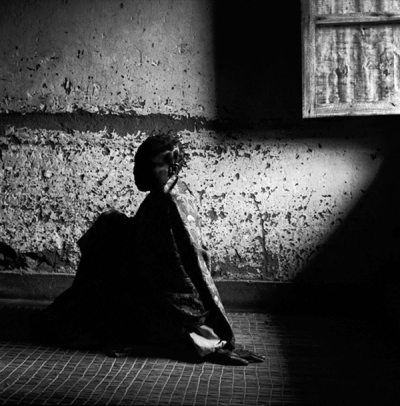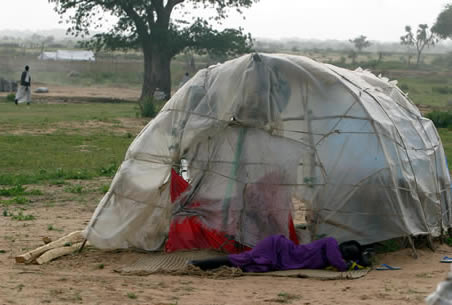May 26, 2006
“I Wish They’d Killed Me” – Rape Atrocities in Congo
Three years ago Henriette Nyota said she was gang raped as her husband and four children were forced to watch. The men in uniform then disemboweled her husband and continued raping her and her two oldest daughters, 10 and 8. The assault went on for three days. “I wish they’d killed me right there with my husband,” she said, “What use am I now? Why did those animals leave me to suffer like this?”
A couple of days ago I posted an overview of an article found in this month’s Forced Migration Review on the lack of reproductive health needs in Darfur and how rape is being used as a tool of war. The quoted text is from an article in CNN today by Jeff Koinange on the situation in the Democratic Republic of Congo (photo is from MSF). There aren’t enough medical professional or resources to treat women who have been sexually violated.
I want to excerpt part of the article which is an interview with Dr. Denis Mukwege Mukengere, the only physician in a hospital in eastern Congo where ten women who have been sexually-assaulted a day are treated and with financial resources earmarked for these women expected to run out by the end of June.
“Some of them have knives and other sharp objects inserted in them after they’ve been raped, while others have pistols shoved into their vaginas and the triggers pulled back,” said Dr. Denis Mukwege Mukengere. “It’s a kind of barbarity that only savages are capable of.” He added that “these perpetrators cannot be human beings.”
I didn’t include this passage to shock or upset, but to engage readers and force us to become more pro-active. We have to work to change policies overseas and look at normative approaches to dealing with sexual violence against women in an armed conflict.
May 24, 2006
Support Ratification of CEDAW
CEDAW is the Convention on the Elimination of All Forms of Discrimination Against Women. It establishes a set of standards for combating discrimination against women and has helped women throughout the world. Women have used this treaty to gain basic human rights such as the rights to vote, to education, and to own property.
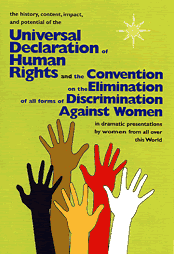 As of May 2006, the Treaty has been ratified by 183 countries with Brunei Darussalam signing today. Its universality counters claims that in certain cultures discrimination, domestic violence, and other forms of oppression are acceptable. The United States is one of the few countries in the world that has not ratified the Treaty. This is a detriment to the struggle for women’s rights, both domestically and internationally. The Treaty can also help address many of these injustices and abuses that exist for women in the States. Without the United States as a party to the Treaty, repressive governments can easily discount the Treaty’s provisions.
As of May 2006, the Treaty has been ratified by 183 countries with Brunei Darussalam signing today. Its universality counters claims that in certain cultures discrimination, domestic violence, and other forms of oppression are acceptable. The United States is one of the few countries in the world that has not ratified the Treaty. This is a detriment to the struggle for women’s rights, both domestically and internationally. The Treaty can also help address many of these injustices and abuses that exist for women in the States. Without the United States as a party to the Treaty, repressive governments can easily discount the Treaty’s provisions.
The U.S. still has not ratified CEDAW (along with Sudan and Somalia) the Convention on the Rights of the Child (again the U.S. enjoying good company with Somalia), and the International Covenant on Economic, Social and Cultural Rights. The U.S. has opposed the recognition of economic, social, and cultural rights like the right to education and healthcare. As well as placed “provisions” or limitations on enforcement the treaties it has ratified.
If you live in the states, you can urge your U.S. Senators to support ratification of CEDAW). Click here for a petition from Amnesty.
May 23, 2006
Violence Against Women & International Law
I promise to keep this short. This is to follow up on yesterday’s post on sexual violence against women in refugee camps. Here is some information I found about the subject in the context of international law and human rights treaties. Amnesty International has a “Stop Violence Against Women” section on their website. This has a lot of great resources for activists, those that want to know more about women’s rights and what’s being done or are interested in being a campaign coordinator.
This is from Amnesty International:
Foundations of Women’s Human Rights in International Law
- The Universal Declaration of Human Rights stipulates that human rights apply to all people equally, “without distinction of any kind such as race, color, sex, language…or any other status”.
- The Convention on the Elimination of All Form of Discrimination Against Women (CEDAW),or the International Women’s Human Rights Treaty, was adopted by the UN in 1979. CEDAW was the first document to comprehensively address women’s rights within political, cultural, economic, social and family spheres.
- The 1993 Declaration on the Elimination of Violence Against Women (DEVAW)set forth ways in which governments should act to prevent violence, and to protect and defend women’s rights. DEVAW holds states responsible to “exercise due diligence to prevent, investigate and, in accordance with national legislation, punish acts of violence against women, whether those acts are perpetrated by the state or by private persons”.
The Rome Statute of the International Criminal Court includes as rape those situations where the victim is deprived of her ability to consent to sex, including providing sex to avoid harm or to obtain basic necessities. It recognizes rape and other forms of sexual violence by combatants in the conduct of armed conflict as war crimes. When rape and sexual violence are committed as part of a widespread or systematic attack directed against any civilian population, they are considered crimes against humanity, and in some cases may constitute an element of genocide.
May 22, 2006
Rape as a Tool of War: Abortion Care Needs in Darfur
Raped women have to live with the threat of HIV/AIDS, with access to only minimal medical care in Darfur and in refugee camps in neighbouring Chad.
A colleague of mine brought this article to my attention. It’s in the latest issue of Forced Migration Review(May 2006), dealing with people trafficking. This is the in-house journal for the Refugee Studies Centre in Oxford. The whole issue can be downloaded as a PDF. If you get a chance, check out Abortion Care Needs in Darfur and Chad by Tamara Fetters. She is a researcher for Ipas, a non-governmental organization working to increase women’s ability to exercise their sexual and reproductive rights.
The writer examines why there is a lack of reproductive health services and treatment of complications that result from unsafe abortions or miscarriages in health facilities for refugees and those internally displaced.
The article states that violence against women in Darfur and in refugee camps in Chad are well-documented. These occur while women are foraging for water, fuel or animal fodder, or during imprisonment. There have also been cases of women being forced to submit to sex in exchange for ‘protection’ by police officers and male residents in the refugee camps.
In addition, Amnesty International reported that in armed conflicts that it investigated in 1999 and 2000, the torture of women was reported, most often in the form of sexual violence. Women and girls make up more than half of refugees in the world. These women are more vulnerable to rape and sexual violence. In addition, unaccompanied women and girls are often regarded as common sexual property in camps and may face forced prostitution as well as coercion into sex in exchange for food, documents or refugee status.
Rape is not an accident of war, or an incidental adjunct to armed conflict. Its widespread use in times of conflict reflects the unique terror it holds for women, the unique power it gives the rapist over his victim, and the unique contempt is displays for its victims. The use of rape in conflict reflects the inequalities women face in their everyday lives in peace time. Until governments take responsibility for their obligations to ensure equality, and end discrimination against women, rape will continue to be a favored weapon of the aggressor. – Amnesty International
May 19, 2006
Support Sudanese NGOs Facing Persecution
I wanted to share this alert from Human Rights First. It calls on the Sudanese government to stop the harassment and legal persecution of NGOs, human rights and humanitarian organizations in Sudan, whose work has been critical in the Darfur crises.
President Omar al-Bashir’s officials have passed legislation in an effort to prevent independent organizations from documenting and publicizing human rights violations. This is in addition to human rights defenders being arrested, beaten, and “disappeared” while carrying out their work.
This is an excerpt from the press release:
“On April 11, 2006, the Sudanese government froze the assets of a local women’s rights organization called the Women’s Awareness Raising Group (AWOON) – Red Sea , making it impossible for the organization to continue its work. AWOON plays a vital role in promoting women’s rights in Sudan and addresses critical issues facing Sudanese women through human rights training, advocacy and free legal assistance.”
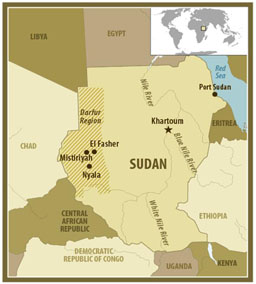 AWOON is a local NGO of female lawyers who provide legal assistance and advocate to promote women’s & children’s rights in Port Sudan. They submitted a proposal last summer to the EU, seeking funds for a campaign to promote women’s rights to access a counsel and funds for a training course for lawyers and activists. Althought the request for this project was and got underway this March, it was abruptly bought to an end.
AWOON is a local NGO of female lawyers who provide legal assistance and advocate to promote women’s & children’s rights in Port Sudan. They submitted a proposal last summer to the EU, seeking funds for a campaign to promote women’s rights to access a counsel and funds for a training course for lawyers and activists. Althought the request for this project was and got underway this March, it was abruptly bought to an end.
At a time when Sudan has been complicit in crimes against humanity and failed to protect its citizens, it is important for nongovernmental organizations like AWOON to be able to carry out their work. Human Rights First is trying to put pressure on Sudan to stop persecuting human rights defenders by demanding that AWOON – Red Sea be allowed to resume its operations and have access to its financial resources.
You can sign the electronic petition to Ambassador H.E. Khidir Haroun Ahmed and H.E. Ambassador Omer Manis here.
May 9, 2006
Protecting African Sisters Protects Africa’s Future
I have written a couple of posts before on HIV/AIDS in South Africa. The verdict for SA’s former deputy president Jacob Zuma was reported yesterday. AllAfrica.com picked up the story from IRIN. No surprise really that he was acquitted on rape charges. While the judge believed the sex was consensual, he did chastise Zuma for not using protection even though he knew the woman was HIV-positive. In Blogher’s post she excerpted this bit from the NYT. It’s upsetting that this attitude still exists:
“AIDS hotlines were briefly besieged after his testimony with queries from men asking whether soap and water could prevent AIDS infections. Judge Van der Merwe said today that Mr. Zuma’s remark was beneath comment.”
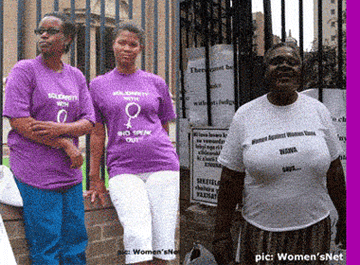
What this trial has done is draw attention to sexual violence in South Africa, which IRIN reports as having one of the highest incidences of reported rape in the world. Women’s rights groups like People Opposing Women Abuse (POWA) protested outside the courthouse during Zuma’s trial. POWA was part of the “One in Nine”campaign. This is in reference to the number of women who have reported being raped. Between April 2004 and March 2005, 55,114 cases were reported to the police. Read the rest of this entry »
April 26, 2006
Small Steps in the Gulf toward Emancipation
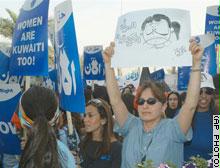 Democracy in the Middle East? We can’t rule it out just yet. In happier news from the region, earlier this month, Kuwaiti women casted votes in an election and presented candidates for the first time. This comes less than one year after winning full political rights in the oil-rich Gulf state. This election for a municipal court is being seen as a litmus test of how women might fare in next year’s parliamentary elections.
Democracy in the Middle East? We can’t rule it out just yet. In happier news from the region, earlier this month, Kuwaiti women casted votes in an election and presented candidates for the first time. This comes less than one year after winning full political rights in the oil-rich Gulf state. This election for a municipal court is being seen as a litmus test of how women might fare in next year’s parliamentary elections.
Two of the eight candidates who ran for a seat in the district of Salmiya were women. Jinan Boushehri, 32, is a chemical engineer who heads the municipality’s food testing administration. Khalida al-Khader, 48, is a physician and mother-of-eight.
Hopefully this trend continues in Kuwait and next year women will be present at the parliamentary level. I think it’s interestin to follow this and see if Kuwait could serve as an example for other countries in the Gulf region. I hope this serves as a step toward democracy and granting of political rights to women in the Middle East. When Condi or Karen Hughes travel in the region on their PR campaigns of how great modernization is and why they should embrace Western principles, they should capitalize on what’s coming out of these elections in Kuwait. I would think women identify as a group first, then by ethnicity, religion or nationality.
Sheikha Hussa, Vice-President of the Women’s Commission in Kuwait, recently said at a press conference she hoped Kuwaiti women would move further along the line to take up roles in local and national politics.
“We see that among Kuwait women we have a minister, the Minister of Planning, and we are looking forward to having more than just one woman in the new Cabinet. We are also looking forward to having more women Ambassadors and we hope there will be several women in those posts.”
